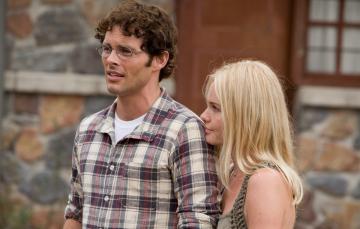Decades of film violence absorb the shock value of 'Straw Dogs'
Sam Peckinpah's loathsome landmark "Straw Dogs" (1971) was a faithful follow-up to his blood 'n' guts groundbreaker, "The Wild Bunch" (1968). As founder of a genre, he gave cinema its seminal "beauty of violence" entries -- the dubious gift that keeps on dubiously giving.
"Everyone has a breaking point" was the original "Straw Dogs" idea, recycled here and now in writer-director Rod Lurie's adaptation of Gordon Williams' novel "The Siege of Trencher's Farm." Fans or foes of the '71 film will recall Dustin Hoffman in the hero's role of David Sumner, a wimpy American math professor who moves with his sexy wife Amy (Susan George) to rural Cornwall in order to finish writing a book.
In Lurie's version, David (James Marsden) is a Hollywood screenwriter moving back to Amy's old home and hometown in the deep South -- the aptly named Blackwater, Miss. -- to finish his script on the Siege of Stalingrad.
"Why you makin' a movie about a bunch of Russians?" the locals ask. Because it hails "a fortitude they didn't think they had," replies David -- soon to face a Stalingrad siege of his own. But right off the bat, he runs afoul of the natives by trying to buy beer with a debit card and turning down their fried pickles.
Meanwhile, he's also running afoul of Amy (Kate Bosworth). David is oh-so-creative and balanced, but not so wonderfully attentive to her as he should be. He hires four grubby local yokels to do some roofing on their house. Amy complains of being ogled by those horndogs, when out running in her cutoffs and tank top. "Maybe you should wear a bra," he suggests. "I dress for you, not them," she says. "I already know what you look like naked," he glibly replies.
Marsden has the thankless task of reinventing Hoffman's character creation -- uniquely stammering and stuttering until finally forced to act and react violently. It's a credible if not powerful performance. Likewise with Bosworth's Amy. James Woods is effective as Tom, the town's drunken bully, and so is Dominic Purcell as the village idiot whose seduction by Tom's daughter adds fuel to the violent flames. Bad guys Rhys Coiro, Billy Lush and Drew Powell are villainous enough.
Best of all is Alexander Skarsgard as their ringleader Charlie, Amy's ex-boyfriend -- menacing and alluring in equal measure. "Thou shalt not covet thy neighbor's wife," David tells him. "What if thy neighbor's wife covets you?" Charlie purrs back, speaking nicely to the sexual ambivalence of the heroine.
These rednecks take liberties even Jeff Foxworthy would avoid, but David doesn't start worrying until he finds Amy's pet cat hanging in the closet. (Only stuffed animals were harmed during the making of this film.) Even then, he's like the parent who can't bring himself to confront his kid's bad behavior but keeps giving him "one last chance." When he finally gets around to it, it will involve rifles, bear traps, boiling water and a nail gun -- ouch! -- borrowing that sickest of sado-sick tools from Brett Ellis' "American Psycho."
Plot-and-motivational subtleties aside, this Big Final Orgy of Violence is what folks are payin' to see, of course. Lurie, to his credit, eschews Peckinpah's trademark slo-mo -- but fails to match the impact thereof. How could he, 40 years later? With oceans of blood under the bridge since '71 -- from the "Saw" franchise to "The Passion of the Christ" -- we're inured to it. The shock-value dollar has declined more than the Mexican peso with the devaluation of gore.
Director Lurie ("The Contender," "Nothing but the Truth") says his intent was to capture the original film's intensity while "reconfiguring its horrific contours for the realities and moviegoing sensibilities of a new generation."
WHAT sensibilities? All such sensibilities expired during 40 years' worth of movies like "Straw Dogs." (The title, by the way, likens the human condition to the ancient Chinese ceremonial use of straw dogs as ritual offerings to the gods.) Home-invasion shockers are now commonplace. Standards of screen carnage have changed so much that Amy's rape -- so fiercely debated by cineastes and feminists at the time of the original film's release -- seems relatively tasteful here.
Thus we come full circle to a reprise of the same ancient bottom-line question: What's the point -- and the breaking point? When a pacifist turns into a violent raging warrior? When Michael Dukakis is asked what he'd do if his wife were raped? Gimme a break -- and a breaking point of my own. I found it long ago with the whole bogus "beauty of violence" concept.
But for moviegoers, anything goes when you're the straw underdog.






